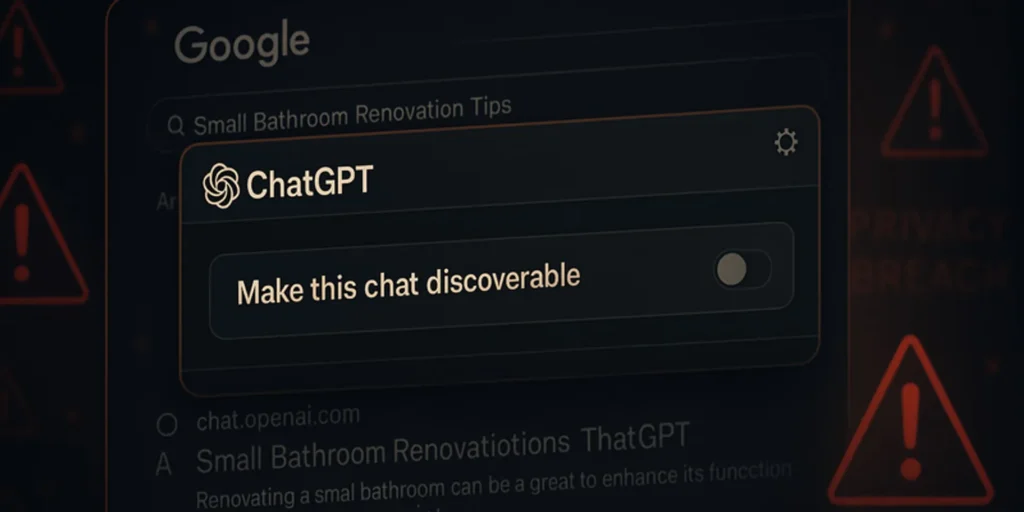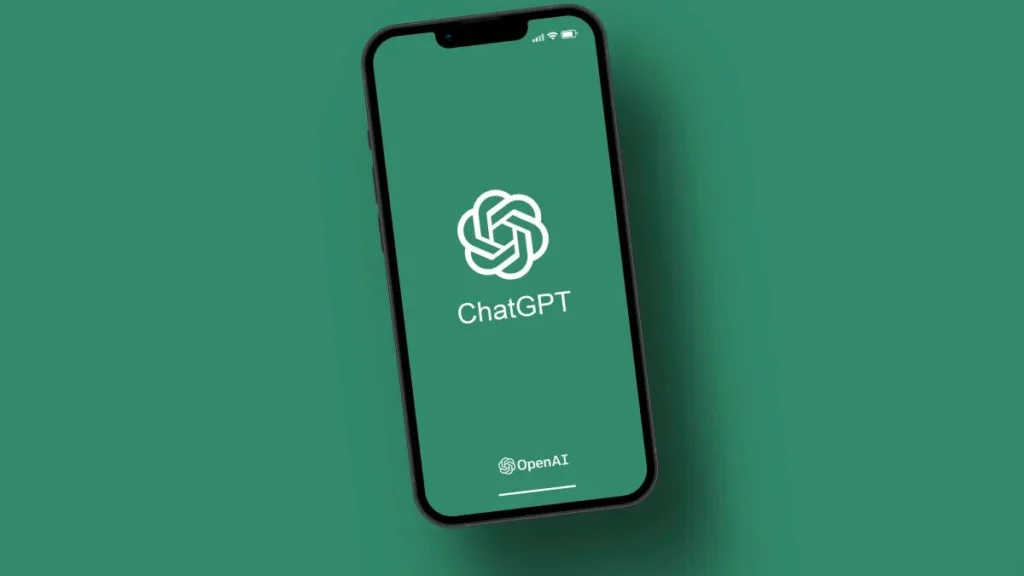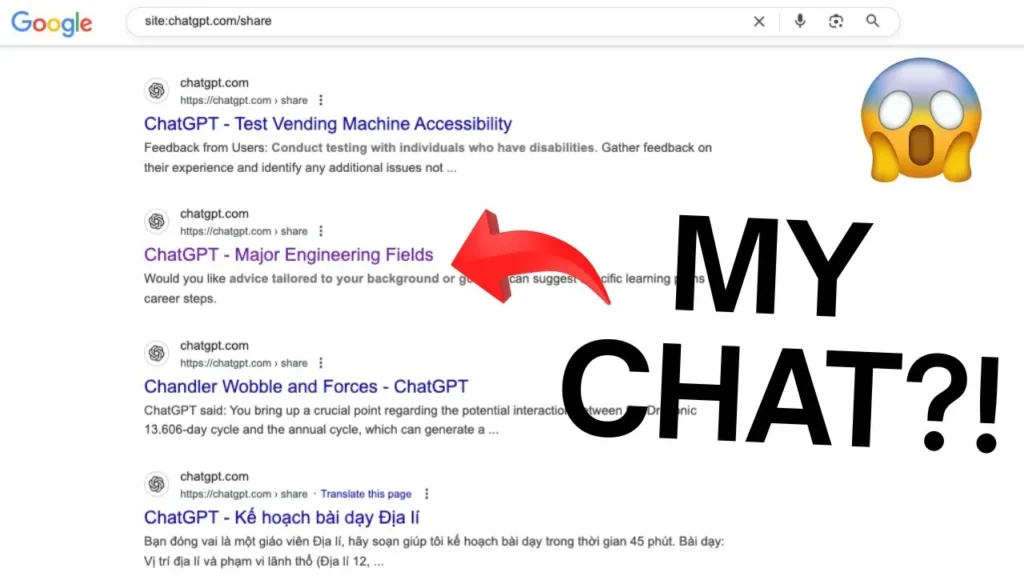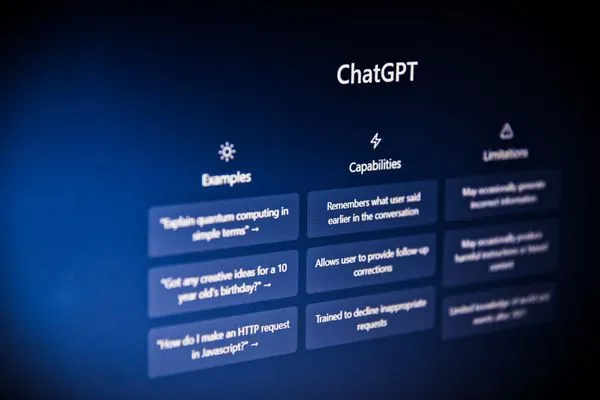ChatGPT conversations were recently found indexed on Google, raising serious privacy concerns. Learn how it happened, OpenAI’s response, and how U.S. users can protect their data.

In recent weeks, a shocking revelation has surfaced that has sent waves through the AI and tech communities: some ChatGPT conversations were getting indexed by Google and becoming publicly searchable. While OpenAI has acted quickly to address the issue, this development has reignited serious discussions about AI privacy, user data protection, and how tools like ChatGPT handle your conversations.
Table of Contents
🚨 What Happened?
According to reports from Fast Company and Business Insider, certain ChatGPT chats became visible in Google Search results, allowing anyone to read fragments of conversations that users believed were private.
The issue was linked to ChatGPT’s “shared links” feature, which allowed users to create a link to any conversation and share it publicly. But here’s the catch: Google’s web crawler indexed these shared links, which meant they were now accessible via search.
OpenAI confirmed this in July 2025 and immediately took down the feature, citing growing concerns over search engine privacy and the accidental exposure of personal or sensitive data.

🔐 Why This Is a Big Deal
When users interact with ChatGPT, especially on sensitive or professional topics, they often assume a level of confidentiality. The revelation that chats could be indexed by Google has raised serious red flags, especially around:
- Privacy risks
- Unintentional sharing of proprietary or confidential information
- Potential reputational harm
Imagine entering confidential business ideas, personal medical information, or even draft emails—and having that show up publicly in search results.
📉 OpenAI’s Immediate Response
In light of the backlash, OpenAI removed the shared links feature temporarily. As reported by VentureBeat, the company is reevaluating how these shared links are structured and intends to prevent future indexing issues. They also clarified that only shared links were at risk, and regular private chats remain confidential.
“We’ve disabled the shared links feature to ensure no ChatGPT conversations are exposed via search engines,” OpenAI said in an official statement.
Still, many users are wondering—was this just the beginning of more privacy issues in AI tools?
🧠 Why Google Indexed ChatGPT Conversations
Let’s break it down.
When you share a ChatGPT conversation via a link, OpenAI creates a public-facing webpage. By default, unless coded otherwise, search engines like Google crawl and index these pages.
While OpenAI could have implemented robots.txt exclusions or noindex meta tags to prevent this, those measures were not in place for the shared links. The result? Conversations started popping up in search results, often without the knowledge of the original users.

🧪 ChatGPT and User Trust: A Tenuous Balance
This incident reveals a much larger challenge in the age of conversational AI—user trust. While ChatGPT has revolutionized productivity, communication, and content creation, the expectation of privacy is now being tested.
OpenAI has long stated that ChatGPT conversations may be used to train future models, unless users opt out. But most users didn’t expect public exposure via Google.
The key takeaways?
- Transparency: Users must be informed about how their data is stored and shared.
- Control: There should be robust controls for opting out of data sharing or making chats truly private.
- Education: Users must be educated on what features could make their data public.
🧰 How to Protect Your Privacy When Using ChatGPT
If you’re using ChatGPT regularly—whether for business, school, or personal tasks—it’s important to know how to safeguard your information.
✅ Here are some tips:
- Avoid entering sensitive personal data like passwords, financial details, or social security numbers.
- Do not include client names, internal project details, or proprietary business strategies unless you’re certain it’s safe.
- Use the opt-out feature in ChatGPT settings to prevent your chats from being used for training.
- Avoid using shared links until OpenAI reintroduces the feature with better safeguards.
- Manually delete conversations you no longer want stored in your chat history.
🧭 What’s Next for OpenAI and ChatGPT?
This latest privacy scare will likely push OpenAI—and other companies building AI chatbots—to implement:
- Stronger data governance policies
- User-level privacy controls
- Improved transparency about how data is used and where it can end up
As the AI race heats up between OpenAI, Google, Anthropic, and others, maintaining user trust could be the deciding factor in long-term dominance.

🇺🇸 Why U.S. Users Should Pay Extra Attention
U.S. consumers are particularly vulnerable due to less stringent privacy laws compared to Europe (e.g., GDPR). Without federal AI privacy regulation, tech companies largely self-regulate, which leads to inconsistencies in data handling.
It’s a wake-up call for American users: you must take charge of your digital privacy, especially when using emerging technologies like ChatGPT.
📢 Final Thoughts: The Trade-Off Between Convenience and Privacy
ChatGPT is powerful, convenient, and increasingly embedded in daily workflows. But this incident underscores a crucial truth: AI tools are only as private as the platforms that host them.
As tech companies evolve their privacy practices, users must also evolve their habits. Don’t assume every chat is private—unless the platform explicitly guarantees it.
And always think twice before hitting “share.”
chatgpt, google indexing chatgpt conversations, openai chatgpt privacy, chatgpt search engine leak, chatgpt shared links, chatgpt privacy issue, chatgpt google search, openai removes shared chat feature, chatgpt conversations leaked, chatgpt google data exposure, chatgpt security tips, how to protect data in chatgpt, chatgpt privacy settings, us user data privacy, ai chatbot data leak
Thank You for visiting Tech Uplifter!
Don’t forget to Subscribe to our Official Newsletter for latest updates.

